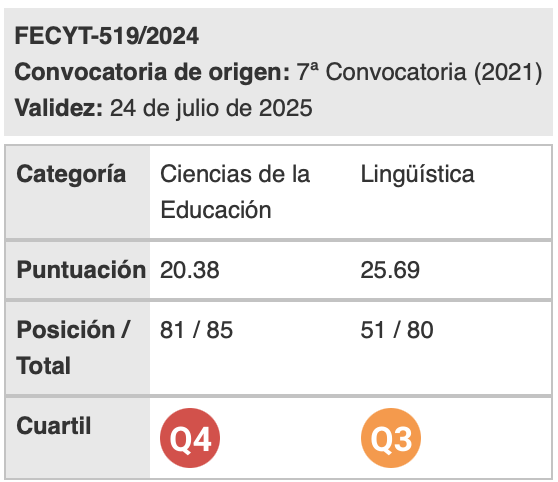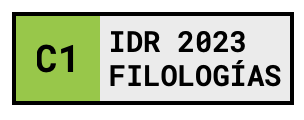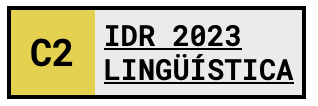Publication Ethics
Publication Ethics and Malpractice Statement
This "Publication Ethics and Malpractice Statement” section is given to provide authors with a framework for considering and implementing their own publication ethics policies and systems. Revista de Lenguas para Fines Específicos is committed to ensuring ethics and avoiding profesional malpractice in publication and quality of articles and book reviews. For this reason, Revista de Lenguas para Fines Específicos follows the Ethical Guidelines for Peer Reviewers provided by the Committee on Publication Ethics (COPE), to which Editors and their editorial boards can refer for guidance. These guidelines may be read here. Ethics and fair practices in publication obviously lead to responsible scholarly communication and the guidelines hereby included pursue this target.
Academic publishing depends, to a great extent, on trust. The Editors of Revista de lenguas para fines específicos trust the opinion and the assessments of peer reviewers and the Editors trust these opinions are bias free. Authors trust the Editors’ good choice of appropriate reviewers to examine and evaluate their submissions for publication in the journal, and authors have trust in the peer-review process. In this sense, the Editors believe that good publication practices and publication ethics develop and rely on the following aspects: (1) Transparency and conflicts of interest, (2) Authorship and originality of submitted material, (3) Accuracy of data and material provided, (4) Avoidance of author’s misconduct and research integrity, (5) Plagiarism, (6) Assurance of intellectual property, (7) Copyright statement, (8) Peer Review conduct, (10) Appeals to editorial decisions, (11) Editorial independence.
Transparency and conflicts of interest. Readers have the right to know about such aspects as funding and funders, and these should be clearly disclosed in an acknowledgments section. Editors, authors, and peer reviewers have the responsibility to disclose interests that might appear to affect their ability to present or review data objectively. The Journal’s Editors require statements concerning conflicts of interest from authors and reviewers. Thus, potential conflict of interest is disclosed to the Editors in the "Comments to the Editors" during the submission process. See “Submission Preparation Checklist”. In case a reader suspects undisclosed conflict of interest, please read COPE's guidance ‘What to do if a reader suspects undisclosed conflict of interest (CoI) in a published article?’ (Flowchart). Reviewers suspecting undisclosed conflict of interest should read COPE’s ‘What to do if a reviewer suspects undisclosed conflict of interest in a submitted manuscript?’ (Flowchart).
Authorship and originality of submitted material. The author/s guarantee(s) the authorship of the documents presented, as well as any text or image. If the article or book review has significant contributions from more than one author, all of them should appear as co-authors and should accurately reflect who did the work. All authors meet the journal's criteria for authorship and that nobody who meets these criteria has been omitted from the list. The authors also guarantee that their paper is original and is not under consideration in any other journal. The paper has not been published in part or in full elsewhere. See the “Author Guidelines”.
Accuracy of data and material provided. The Editors of Revista de Lenguas para Fines Específicos have a responsibility to ensure the accuracy of the material they decide to publish in the light of the evidence given in the reviewers’ assessments. Authors are asked about accuracy of data and authorship during the submission process. See “Submission Preparation Checklist”. In order to offer accurate information, the Journal publishes corrections when errors are found, especially when these errors lead to misinterpretation of the information presented in the research articles or book reviews. The Authors are encouraged to inform the Journal’s Editors of errors found after publication at any time in written form via email (lfe@ulpgc.es).
Avoidance of author’s misconduct and research integrity. Suspect of research misconduct will open an investigation process to clear the situation. This may be revealed by reviewers during the peer-review process, and this information from reviewers should be taken seriously by the Editors of Revista de Lenguas para Fines Específicos, and the authors have the right to respond to allegations. Whenever the Editors are not in the position to disclose and evince research misconduct, they must alert appropriate bodies and encourage them to investigate. Read the Flowcharts 3a and b ‘What to do if you suspect fabricated data’ and Flowcharts 4a and b ‘What to do if you suspect plagiarism’ from Committee on Publication Ethics (COPE). Research integrity includes the protection of the rights of research participants and subjects. The Editors of Revista de Lenguas para Fines Específicos should seek assurances that studies have been approved by relevant bodies, and they should encourage peer reviewers to consider ethical issues raised by the research they are reviewing. Editors should request additional information from authors in case they feel this is required.
Plagiarism. The Editors of Revista de Lenguas para Fines Específicos and readers have a right to expect that submitted work is the author's own and that means that the work presented has not been plagiarized (i.e. taken from other authors without permission in part or in full, if permission is required) and that copyright has not been breached (for example, in the case of others’ figures or tables are reproduced).
We ask authors to declare that the work reported is their own and that they are the copyright owner. See “Submission Preparation Checklist”. All works submitted are checked to spot potential plagiarism using Turnitin© anti-plagiarism software, and guidance is to be found in COPE’s directions ‘What to do if you suspect plagiarism?’. This is the standard and official means in the University of Las Palmas de Gran Canaria for this purpose. Other forms of misconduct will be treated accordingly following the guidance in Ethics in Research & Publication – Elsevier.
Assurance of intellectual property. The authors of Revista de Lenguas para Fines Específicos have a right to protect their intellectual property. Revista de Lenguas para Fines Específicos licenses content from authors, they have the copyright of their papers. The authors may transfer the copyright from their papers to the Editors of Revista de Lenguas para Fines Específicos.
Copyright statement. Prospective authors who publish with this journal agree to the following terms: (a) authors retain copyright and grant the journal right of first publication with the work simultaneously licensed under a Creative Commons Attribution License that allows others to share the work with an acknowledgement of the work's authorship and initial publication in this journal; (b) authors are able to enter into separate, additional contractual arrangements for the non-exclusive distribution of the journal's published version of the work (e.g., post it to an institutional repository or publish it in a book), with an acknowledgement of its initial publication in this journal; (c) Authors are permitted and encouraged to post their work online (e.g., in institutional repositories or on their website) prior to and during the submission process, as it can lead to productive exchanges, as well as earlier and greater citation of published work (See The Effect of Open Access).
Peer Review conduct. Authors should expect that peer reviewers or other individuals privy to the work an author submits to Revista de Lenguas para Fines Específicos will not take their research ideas without permission, plagiarize or even publicize their work prior to acceptance and publication. Revista de Lenguas para Fines Específicos makes clear to peer reviewers that material is in confidence until it has not been published (Read Notes for reviewers). Editors of Revista de Lenguas para Fines Específicos protect peer reviewers from authors and, even if peer reviewer identities are revealed, should discourage authors from contacting peer reviewers directly, especially if misconduct is suspected. The Editors should follow the directions in COPE’s ‘What to do if you suspect peer review manipulation during the peer review process?’ and ‘How to spot potential manipulation of the peer review process?'.
Timing. The process of peer review is the following:
Submission of paper > Assessment by editors > Appraisal by the Editor-in-Chief > the Editor-in-chief assigns an associate editor or him/herself > Invitation to reviewers > Response to invitations > Review is conducted > Journal’s evaluation of the reviews > Decision is communicated to authors.
Editors of Revista de Lenguas para Fines Específicos should ensure timely peer review and publication for the submissions they receive, especially in the case of those research papers whose findings are felt to have important implications. Authors should be aware that priority publication revolves around this aspect. The timing of publication may also be influenced by themed issues.
Appeals to editorial decisions. The authors may appeal editorial decisions in written form, and The Editors will use Elsevier’s Publishing Ethics Resource Kit (PERK) in cases of appeal. It is the Editors’ duty to mediate all exchanges between authors and reviewers during the peer-review process. Reviewers should abide by the COPE Ethical Guidelines for Peer Reviewers. Should disagreement arise, the Editors may invite additional evaluations from new reviewers during the blind peer-review process. All documentation will be stored in the OJS platform of Revista de Lenguas para Fines Específicos. This journal allows LOCKSS to store and distribute journal content at participating libraries via LOCKSS (See).
Editorial independence. Editorial independence is guaranteed and has to be respected by all parts in the publication process. The Journal’s Publisher (ULPGC) cannot interfere with editorial decisions. The Publisher and the Editors work collaboratively to set the best policies to ensure good professional practices in publication. This includes the correct handling of disputes.
Revista de Lenguas para Fines Específicos
University of Las Palmas de Gran Canaria
























